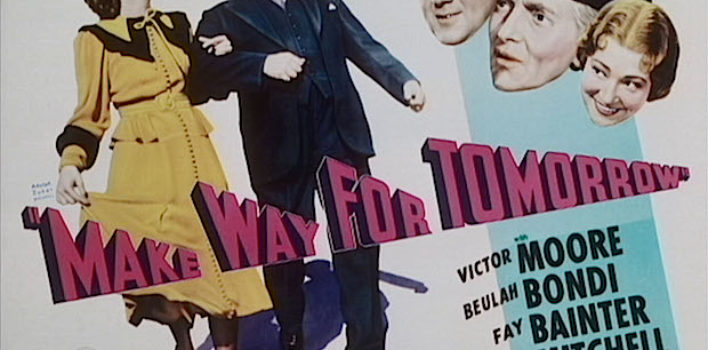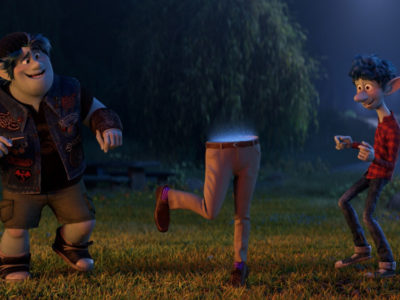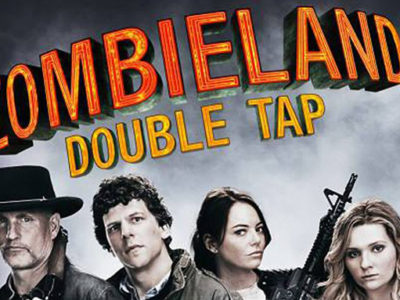Reviewing the Classics| Make Way for Tomorrow
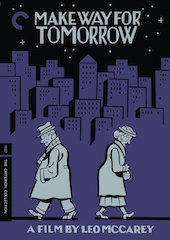 When Leo McCarey won an Academy Award for directing The Awful Truth, he began his acceptance speech with the following: “I want to thank the Academy for this wonderful award, but you gave it to me for the wrong picture.” That same year also saw the release of one McCarey’s saddest, and perhaps most significant film, Make Way For Tomorrow. A wonderfully versatile comedic director, whose credits range from the Marx Brothers’ Duck Soup to the romantic An Affair to Remember, McCarey’s Make Way For Tomorrow might make you laugh, but it almost certainly will make you cry.
When Leo McCarey won an Academy Award for directing The Awful Truth, he began his acceptance speech with the following: “I want to thank the Academy for this wonderful award, but you gave it to me for the wrong picture.” That same year also saw the release of one McCarey’s saddest, and perhaps most significant film, Make Way For Tomorrow. A wonderfully versatile comedic director, whose credits range from the Marx Brothers’ Duck Soup to the romantic An Affair to Remember, McCarey’s Make Way For Tomorrow might make you laugh, but it almost certainly will make you cry.
The film’s opening puts its thematic cards on the table: this is a film exploring the fifth commandment, “honor thy father and thy mother.” The first scene shows the four Cooper siblings returning home to their elderly parents, Barkley (Victor Moore) and Lucy (Beulah Bondi), who reveal that their house is in foreclosure. The siblings decide to split mom and dad between them for a few months, just until a new home can be secured. Barkley and Lucy have never really been apart from one another, but what can be done? They are at the mercy of their children.
What makes this opening scene work so well is its ability to reveal so much about each character with very little in the way of action or dialogue. This scene—and the entire film—is one of the better pictures of familial dynamics, how selfish desires and miscommunication create tension and drama. George (Thomas Mitchell) is the older, responsible brother, who gladly offers to take his mother in. Cora (Elisabeth Risdon) is the cynical, glass-half-empty sister who reluctantly takes in their father, mostly due to viewing their clownish younger brother, Robert (Ray Mayer) as irresponsible and their wealthy, pretentious sister Nellie (Minna Gombell) as her competition. You feel like you already know these characters—there’s a George, a Nellie, a Cora, and a Robert in every family.
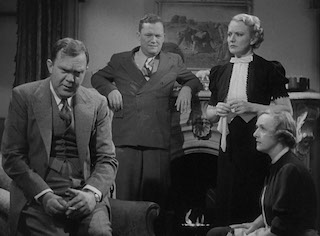 Lucy and Barkley sadly part ways, a situation which only becomes more tragic as we begin to understand their marital relationship. Their marriage is one of my favorites to watch on screen, as there aren’t too many films featuring strong, healthy, honest marriages. It’s easier and more dramatic to depict a marriage falling apart; it’s much harder (both in movies and in real life) to foster healthy relationships of commitment and compassion. Bondi and Moore imbue a youthful vitality in their elderly couple, one which makes their separation due to circumstances all the more disheartening.
Lucy and Barkley sadly part ways, a situation which only becomes more tragic as we begin to understand their marital relationship. Their marriage is one of my favorites to watch on screen, as there aren’t too many films featuring strong, healthy, honest marriages. It’s easier and more dramatic to depict a marriage falling apart; it’s much harder (both in movies and in real life) to foster healthy relationships of commitment and compassion. Bondi and Moore imbue a youthful vitality in their elderly couple, one which makes their separation due to circumstances all the more disheartening.
Make Way For Tomorrow teeters on the edge of sentimentality and melodrama, but never takes the plunge. Instead, it elicits strong feelings of empathy and compassion for its characters, treating them with the dignity they deserve. McCarey never demonizes either the elderly couple or the siblings. Everyone is both the victim and the victimizer, and all have their own faults. It’s whether they are aware of these flaws or not which draws us closer to certain characters, as we are comforted by their self-awareness and willingness to ask for forgiveness from others. At one point, Lucy finds herself caught between her daughter-in-law and granddaughter when the latter runs off one night with an older man, an act Lucy chooses not to reveal to others. While the daughter-in-law verbally reprimands Lucy for the lack of honesty—rightfully so, to some degree—Lucy is clearly broken by the situation. “I’m sorry,” she interjects, with a tone of authentic remorse. She’s a mother, too. She understands where her daughter-in-law is coming from. Lucy’s self-awareness isn’t always present; she interrupts her daughter-in-law’s bridge game to share stories or talk loudly on the phone, which is both hilarious and heartbreaking. There’s a balancing act with obliviousness to others’ needs and a confident self-understanding. I suppose this is why it feels so authentic and so sad.
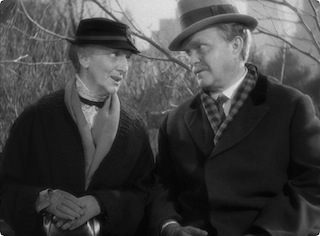 I’ve mentioned the sadness of this film, and it’s not just with its heartbreaking ending. A scene between Barkley and a friendly local shopkeeper made me fight back tears as the shopkeeper reads a letter from Lucy aloud to Barkley. The shopkeeper can’t even finish the letter, an act of mercy for the audience’s emotions. Yet after Barkley leaves, he calls his own wife into the room, just so he can look at her. He perceives the longing between this unwillingly estranged couple and chooses to enjoy the gift of his wife’s presence (despite her confusion about the request). In another scene, George is debating whether he should place his mother in a nursing home. He feels guilty about even considering the idea, but also feels pressure from his wife and daughter due to the tension in their home with his mother around. But Lucy, having discerned his intentions, chooses to suggest that she be placed in a nursing home, saving George from the difficulty of making the decision. She sacrifices her own needs for his. She’s his mother, after all.
I’ve mentioned the sadness of this film, and it’s not just with its heartbreaking ending. A scene between Barkley and a friendly local shopkeeper made me fight back tears as the shopkeeper reads a letter from Lucy aloud to Barkley. The shopkeeper can’t even finish the letter, an act of mercy for the audience’s emotions. Yet after Barkley leaves, he calls his own wife into the room, just so he can look at her. He perceives the longing between this unwillingly estranged couple and chooses to enjoy the gift of his wife’s presence (despite her confusion about the request). In another scene, George is debating whether he should place his mother in a nursing home. He feels guilty about even considering the idea, but also feels pressure from his wife and daughter due to the tension in their home with his mother around. But Lucy, having discerned his intentions, chooses to suggest that she be placed in a nursing home, saving George from the difficulty of making the decision. She sacrifices her own needs for his. She’s his mother, after all.
I currently live with my mother-in-law, a situation not unlike some of the moments in Make Way For Tomorrow. We have our moments of conflict and drama, but films like McCarey’s also remind me of the gift of having healthy, present parents. For a film made in 1937, it feels strikingly contemporary in its exploration of family dynamics and what it means to grow old in our culture. It also makes me think of the legacy I will leave my own children. Barkley and Lucy, for all their love of each other, managed to raise some fairly selfish children. I hope my own kids grow into people of character and integrity, who give sacrificially for each other and their neighbor. Make Way For Tomorrow reminds me that the future is shaped by our choices within the present. Who knows what tomorrow brings? Today, we can only be present with the ones we love and make the most of every opportunity to remind them of our affection. Now, I think I’ll go tell my wife I love her.


